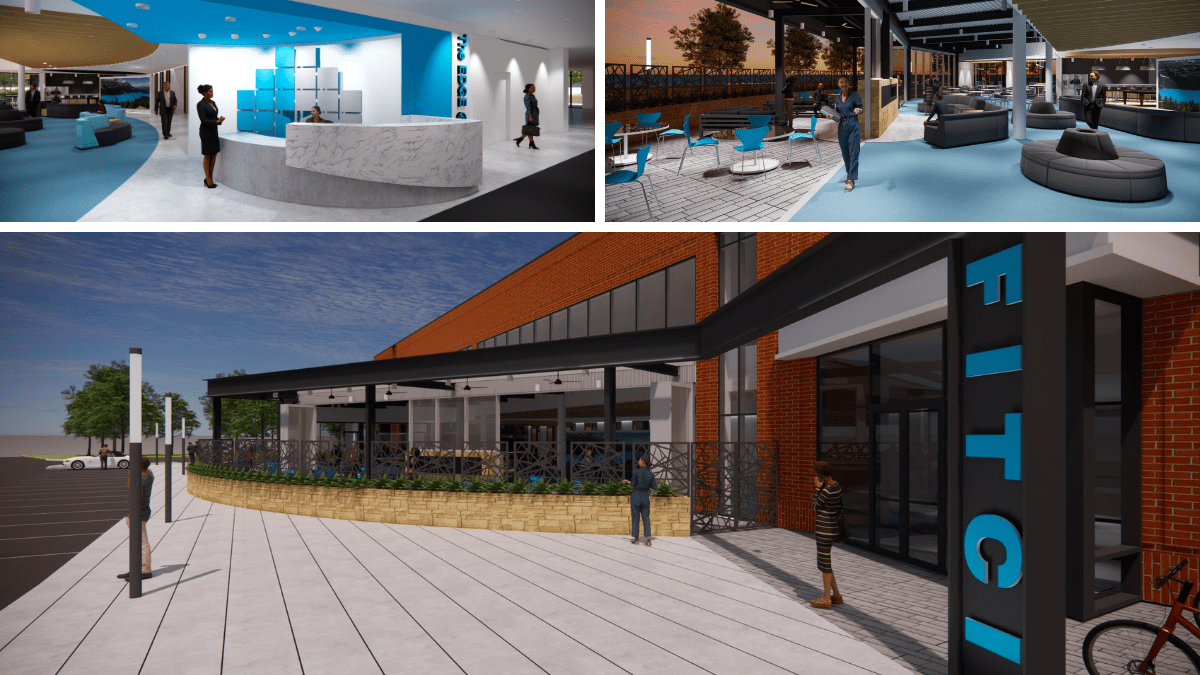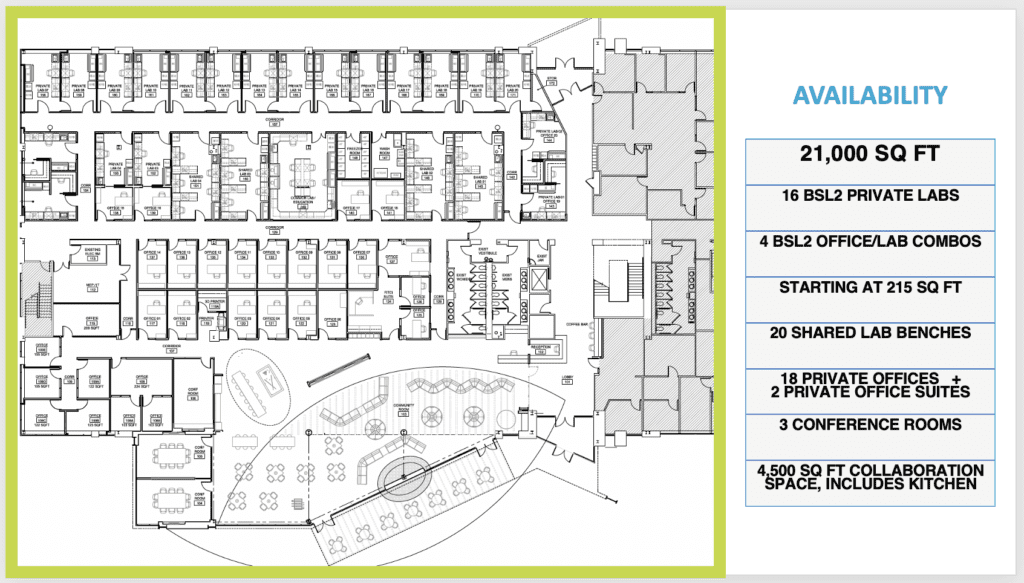
(Image Credit: FITCI)
With New EDGE Expansion, FITCI Looks
Toward a Bright Future
Sponsored by ECBuild / EwingCole
When Kathie Callahan Brady joined FITCI (Frederick Innovative Technology Center, Inc.) in 2016, the nonprofit incubator and accelerator only had 12 companies and a low success rate. Now, in 2022, FITCI has 74 members, a 93% success rate, and is currently expanding into its third building.
With its new expansion, EDGE@321 (Enabling Development & Growth for Entrepreneurs), FITCI will double its office and lab space in the new Ballenger Bio building on 321 Ballenger Center Drive in Frederick. The 25,000-square-foot space is expected to be completed in early 2023, although some spec suites are already finished.
The EDGE@321 space will be specifically for biotech, life sciences, agritech, and renewable energy companies. FITCI will outfit the building with amenities specifically for these companies, including autoclaves, centrifuges, fume hoods, freezer storage, generator access, and microscopes. Companies at all stages will benefit from FITCI’s robust support system and collaborative nature.
Brady said that getting FITCI to its current state took much time, work, and effort from the community. At the heart of that effort is her belief that “incubator” is the wrong word for the organization she runs.
“And even the term incubator, in my mind, makes zero sense because it implies a little fragile baby chick—and we know entrepreneurs are not little fragile baby chicks. They don’t need to be protected from the world,” Brady said. “I think it’s just the opposite. They need to be surrounded by a collaborative community that recognizes and supports their fierce determination.”
To get more companies working together and in front of the “real world,” Brady began putting newer companies in FITCI’s shared lab space at its Metropolitan Court location until they had secured funding and hired employees. During this time, they could work alongside other start-ups and get their footing before moving into one of FITCI’s larger labs.
But she also wanted FITCI to help more than just start-ups. She wanted companies to grow together in the environment and stay connected as they leveled up and continued to help other startups following in their footsteps.
To create the programming and support she wanted for FITCI’s companies, Brady reached out to CEOs in the Frederick community to offer their expertise. As a newer transplant to Frederick, Brady said the first few CEOs she worked with helped her create an entire network of support. Each person she talked to would introduce her to someone else until she had a whole team of CEOs ready to help FITCI’s companies. Today, 56 CEOs volunteer their time to FITCI.
“They love entrepreneurs, they love what these guys are doing,” Brady said. “They come together once a quarter to talk about their goals. So I think it’s a combination of that brilliant advice and asking them questions and making them accountable to their goals that pushed us to a success rate of 93%, which is just unheard of in most areas.”

Companies move from “start-up” peer groups in their Strategic Growth and Advisory Boards to “emerging” groups to “growth” and “high growth” groups, so they can get to know different mentors and different businesses within the community. The additional programming FITCI offers teaches entrepreneurs how to scale their businesses from the ground up. It covers all stages of growth, from securing capital to writing a business plan to hiring employees.
Now, FITCI attracts entrepreneurs with ideas but little or no business experience who benefit significantly from the programming FITCI offers. At the core of FITCI’s ethos is helping companies succeed, which has become increasingly important in the last few years.
At the onset of the COVID pandemic, Brady told FITCI’s employees to “throw their job descriptions out the window” and focus on helping the companies that FITCI did have.
“All we’re going to do is focus on our companies and use everything we can to make them successful,” Brady said. “They stay alive, we stay alive.”
At that point, she did not expect FITCI to get any new companies during the pandemic. She wanted to focus on maintaining what FITCI did have.
But the opposite happened. FITCI attracted 27 new companies during the COVID pandemic. Implementing virtual programming helped FITCI because companies no longer needed to be in the Metropolitan Court or ROOT buildings—or even live in the immediate area—to become a member.
With the new EDGE@321 expansion, Brady expects to double the number of companies FITCI has again to 140. The new facilities will have 4,500 square feet of community space and double the conference rooms and offices that Metropolitan Court currently has. Like the Metropolitan Court location, the EDGE@321 will have 215-square-foot labs that companies can graduate to once they’ve outgrown their community lab bench. Then, once they’ve become too big for two or three of those labs, they can graduate into a spec suite upstairs.
The spec suites range from 2,000 to 7,000 square feet and are designed to fill a dire need in the life sciences space. When a company has outgrown an incubator space, they’re likely still too small to take on an entire building or office. Most larger spaces also require long-term leases, which growing companies aren’t likely to commit to while hiring new employees, purchasing equipment, and securing capital.
“Your culture is changing. You’re now dealing with a lot of investors … you’re dealing with a lot of customers too all at the same time,” Brady said. “And now you’ve got to figure out how much space you need on the outside market. If you get too much, you’re in trouble, if you don’t get enough, you’re in trouble. It’s a very tough decision.”
FITCI plans to break ground on the renovations to the new building on November 3. Looking forward to the future, Brady has many more ideas she wants to implement to help companies succeed. These include bringing in industry experts that can provide specific expertise on processes like FDA approval and having a direct network of support companies that FITCI’s companies can work with, like attorneys and marketing agencies, all under one roof.
To learn more about FITCI and its programming, visit fitci.org.
“I always say we’re not just space,” Brady said. “We’re about the programs, and the connections, and those types of things that bring people together, whether it’s virtual or in person.”
Discover the latest capital projects making an impact in the region and the companies building them. Click below…








